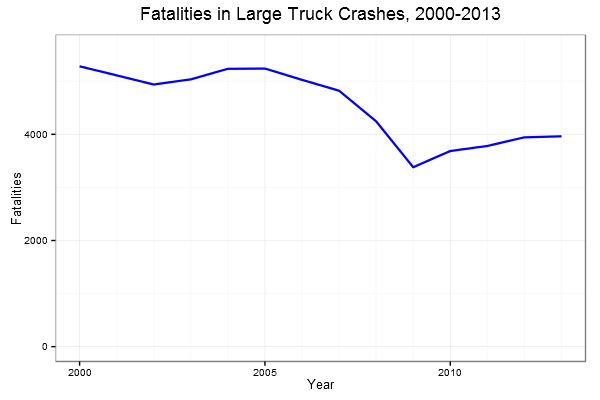Why Are Trucking Fatalities on the Rise?
At The Huffington Post, Michael McAuliff has a long and fascinating piece about the trucking industry's lobbying efforts. It's a story with many layers — the industry has succeeded in beating back new regulations, it's trying to remove some existing ones, etc. — but the hook is that things are worse than they used to be on our highways. The headline is "Trucks Are Getting More Dangerous And Drivers Are Falling Asleep At The Wheel. Thank Congress." One early section is titled "Increasing Carnage On Our Highways."
Here's the data to support that:
Truck-related deaths hit an all-time low during the economic doldrums of 2009, when 2,983 truck accidents killed 3,380 people. But as the economy has recovered, the carnage has been on the rise. In 2013, the most recent year for which finalized statistics are available, 3,541 wrecks killed 3,964 people — an increase of 17.3 percent in just four years. In 2014, the number of deaths resulting from truck accidents was down slightly, but the total number of crashes and injuries increased.
McAuliff deserves credit for admitting the 2009 figure is an all-time low, and for noting the role of the economy. But when I followed his link and started digging, I was suprised to find just how dramatic of a low it was. In just two years, fatalities had dropped 30 percent:

The 2013 data point is actually lower than any number recorded before 2009, even without accounting for population growth. (The data go back to 1975.) It's completely unclear how much of this rise we can ascribe to anything but the economy. With some earlier data added to the picture, it can be argued that trucking fatalities are just returning to their previous trend.
On a side note, the data are also available on a per-mile-driven basis, but I hesitate to read much into them. For one thing, the system for counting truck miles changed dramatically between 2006 and 2007. For another, the numbers suggest the per-mile-driven rate of fatalities fell almost as sharply as the total number between 2007 and 2009: 26 percent. This could mean that more dangerous truck trips are the ones canceled first when the economy goes south, or it could indicate a problem with the new system. At any rate, a similar point holds: Measured this way, 2013 was safer than every year on record save the period 2008-2011.
Robert VerBruggen is editor of RealClearPolicy. Twitter: @RAVerBruggen




